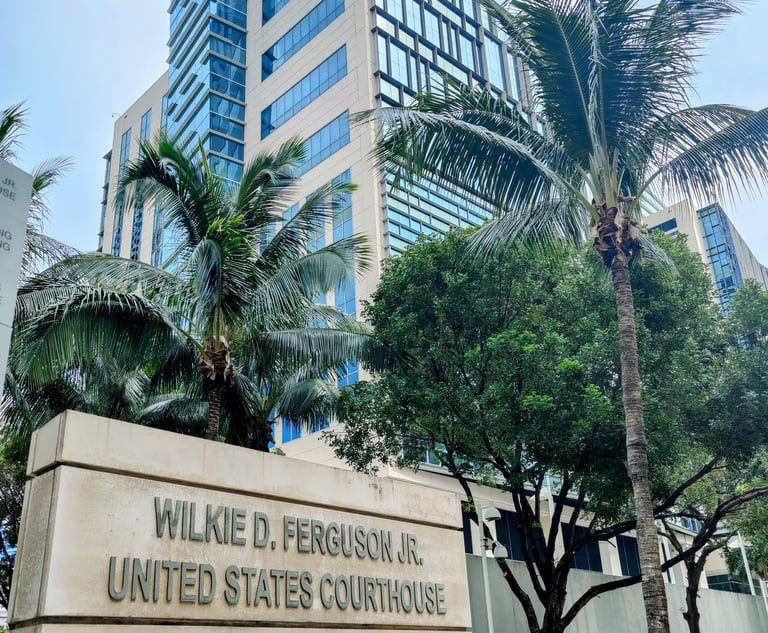State Fights Constitutionality Ruling on Medical Marijuana Law
The closely watched case centers on whether a law passed during a 2017 special legislative session violated a constitutional amendment that broadly legalized medical marijuana.
December 27, 2018 at 12:33 PM
4 minute read
 Medical marijuana/credit: photolona/Shutterstock.com
Medical marijuana/credit: photolona/Shutterstock.com
Defending a 2017 law that set regulations for the state's medical marijuana industry, Florida Department of Health attorneys have asked an appeals court to overturn a circuit judge's ruling that they say “injected confusion and uncertainty” into the licensing of marijuana firms.
The closely watched case centers on whether a law passed during a 2017 special legislative session violated a constitutional amendment that broadly legalized medical marijuana. Leon County Circuit Judge Charles Dodson in October found the 2017 law unconstitutional and issued a temporary injunction requiring state health officials to begin registering the plaintiff, Tampa-based Florigrown, and other medical-marijuana firms to do business.
But in a 41-page brief filed last week at the First District Court of Appeal, DOH attorneys argued that Dodson's temporary injunction should be tossed out and that the 2017 law is constitutional in the way it regulates medical-marijuana treatment centers, as marijuana firms are called.
“[The constitutional amendment] provides a framework under which qualifying patients, physicians, caregivers, medical marijuana treatment centers, and the marijuana itself, would be subject to regulation and oversight,” the brief said. “The amendment also expressly provides that the Legislature may enact laws consistent with the amendment. In June 2017, the Legislature did just that when it enacted a broad regulatory scheme implementing the amendment, including regulations for the licensing of medical marijuana treatment centers.”
But in his October order granting the temporary injunction, Dodson hammered the Legislature for the way it had carried out the constitutional amendment, which was approved by more than 71 percent of voters in 2016.
“The court is concerned the Constitution is being treated as just a recommendation,” Dodson wrote. “It cannot be. The Constitution is the law of the land — the supreme law of our government, which we must all live by. The medical marijuana amendment of the Constitution is specific. Much of that specificity is being ignored.”
The DOH filed the brief last Thursday, two days after the First District Court of Appeal agreed to grant a stay of Dodson's ruling while the case moves forward. The appeals court also said consideration of the case would be “expedited.”
The 2017 law, in part, included caps on the number of medical-marijuana licenses that would be issued by the state and required what is known as a “vertical integration” system that requires marijuana operators to grow, process and sell medical marijuana, as opposed to businesses being licensed to play different roles in the industry.
Dodson wrote in the October order that there would be “irreparable harm” if he did not issue the temporary injunction.
“The public interest was clearly stated with the passage of the Constitution's medical marijuana amendment by over 70 percent of Florida voters,” the judge wrote. “The amendment makes it clear the Department of Health must do the matters required in it to ensure the availability and safe use of medical marijuana by qualifying patients. The department has failed to do so.”
But in the brief filed last week, DOH attorneys pushed back against the idea that the injunction was in the public interest and warned of “confusion and uncertainty” in licensing medical marijuana treatment centers. Currently, 14 firms hold licenses, with 81 dispensing locations across the state, according to the brief.
“[The] public has a strong interest in avoiding the widespread confusion that the order has injected into the MMTC registration process,” the brief said. “Specifically, by ordering the department to begin registering MMTCs without any framework or standards in place, or without specifying what regulatory framework or standards set forth [in state law] would remain in place, the order potentially exposes the public to unqualified parties growing, processing, and dispensing marijuana for medical use completely outside the realm of any regulatory scrutiny or oversight. To state the obvious, that does not serve the public's interest.”
Jim Saunders reports for the News Service of Florida.
This content has been archived. It is available through our partners, LexisNexis® and Bloomberg Law.
To view this content, please continue to their sites.
Not a Lexis Subscriber?
Subscribe Now
Not a Bloomberg Law Subscriber?
Subscribe Now
NOT FOR REPRINT
© 2025 ALM Global, LLC, All Rights Reserved. Request academic re-use from www.copyright.com. All other uses, submit a request to [email protected]. For more information visit Asset & Logo Licensing.
You Might Like
View All
'Close Our Borders?' Senate Judiciary Committee Examines Economics, Legal Predicate for Mass Deportation Proposal
3 minute read

'Stab Venequip in the Back': Caterpillar Faces $100M Lawsuit in Miami Federal Court
3 minute read
Another Roundup Trial Kicks Off in Missouri. Monsanto Faces 3 Plaintiffs
4 minute readTrending Stories
- 1Selendy Gay Files Lawsuit Challenging Trump's Workforce Reclassification EO
- 2Trump's DOJ Withdraws Opposition to Law Banning Trans Care for Minors
- 3Perkins Coie Backs Challenge to Trump's Ban on Transgender Military Service
- 4New Charges Expected in Sex Trafficking Case Against Broker Brothers
- 5With AI, What Changes Can Midsize Firms Expect?
Who Got The Work
J. Brugh Lower of Gibbons has entered an appearance for industrial equipment supplier Devco Corporation in a pending trademark infringement lawsuit. The suit, accusing the defendant of selling knock-off Graco products, was filed Dec. 18 in New Jersey District Court by Rivkin Radler on behalf of Graco Inc. and Graco Minnesota. The case, assigned to U.S. District Judge Zahid N. Quraishi, is 3:24-cv-11294, Graco Inc. et al v. Devco Corporation.
Who Got The Work
Rebecca Maller-Stein and Kent A. Yalowitz of Arnold & Porter Kaye Scholer have entered their appearances for Hanaco Venture Capital and its executives, Lior Prosor and David Frankel, in a pending securities lawsuit. The action, filed on Dec. 24 in New York Southern District Court by Zell, Aron & Co. on behalf of Goldeneye Advisors, accuses the defendants of negligently and fraudulently managing the plaintiff's $1 million investment. The case, assigned to U.S. District Judge Vernon S. Broderick, is 1:24-cv-09918, Goldeneye Advisors, LLC v. Hanaco Venture Capital, Ltd. et al.
Who Got The Work
Attorneys from A&O Shearman has stepped in as defense counsel for Toronto-Dominion Bank and other defendants in a pending securities class action. The suit, filed Dec. 11 in New York Southern District Court by Bleichmar Fonti & Auld, accuses the defendants of concealing the bank's 'pervasive' deficiencies in regards to its compliance with the Bank Secrecy Act and the quality of its anti-money laundering controls. The case, assigned to U.S. District Judge Arun Subramanian, is 1:24-cv-09445, Gonzalez v. The Toronto-Dominion Bank et al.
Who Got The Work
Crown Castle International, a Pennsylvania company providing shared communications infrastructure, has turned to Luke D. Wolf of Gordon Rees Scully Mansukhani to fend off a pending breach-of-contract lawsuit. The court action, filed Nov. 25 in Michigan Eastern District Court by Hooper Hathaway PC on behalf of The Town Residences LLC, accuses Crown Castle of failing to transfer approximately $30,000 in utility payments from T-Mobile in breach of a roof-top lease and assignment agreement. The case, assigned to U.S. District Judge Susan K. Declercq, is 2:24-cv-13131, The Town Residences LLC v. T-Mobile US, Inc. et al.
Who Got The Work
Wilfred P. Coronato and Daniel M. Schwartz of McCarter & English have stepped in as defense counsel to Electrolux Home Products Inc. in a pending product liability lawsuit. The court action, filed Nov. 26 in New York Eastern District Court by Poulos Lopiccolo PC and Nagel Rice LLP on behalf of David Stern, alleges that the defendant's refrigerators’ drawers and shelving repeatedly break and fall apart within months after purchase. The case, assigned to U.S. District Judge Joan M. Azrack, is 2:24-cv-08204, Stern v. Electrolux Home Products, Inc.
Featured Firms
Law Offices of Gary Martin Hays & Associates, P.C.
(470) 294-1674
Law Offices of Mark E. Salomone
(857) 444-6468
Smith & Hassler
(713) 739-1250






